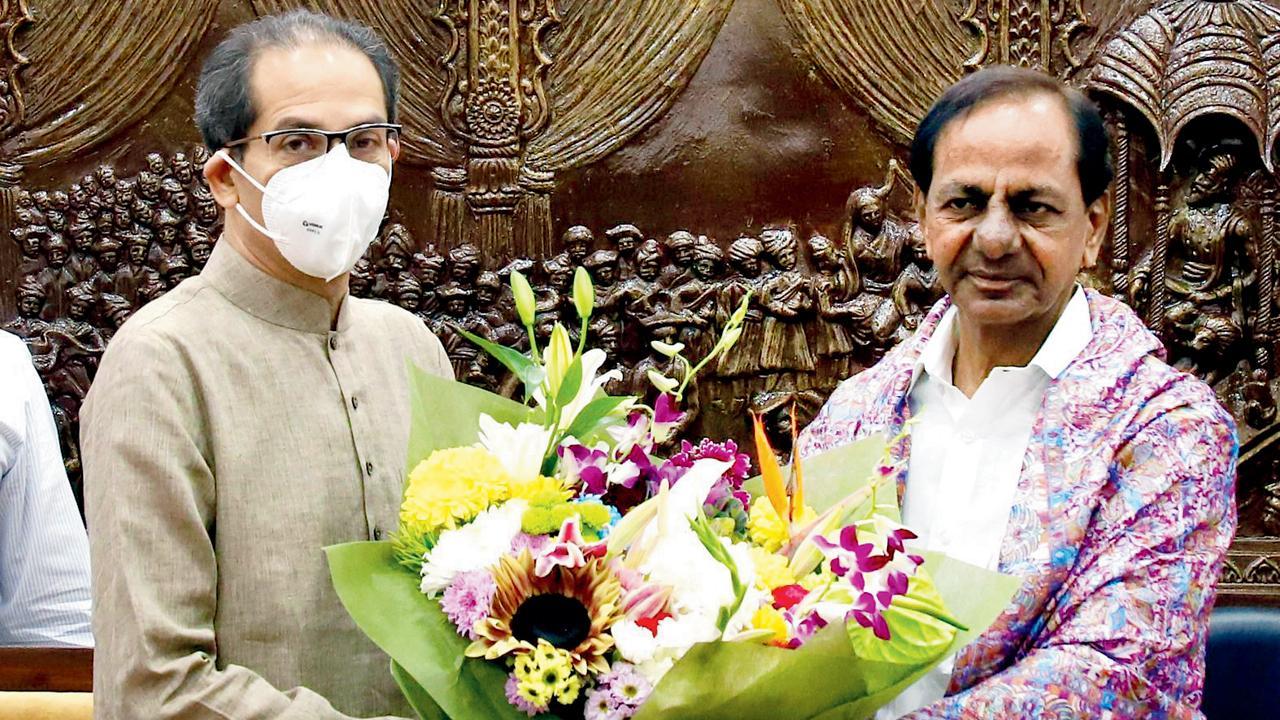KCR’s meetings with Uddhav Thackeray and Sharad Pawar on Sunday give one more push for the anti-Bharatiya Janata Party collective of the Opposition; unlike Mamata, they don’t upset the Congress

Telangana Chief Minister K Chandrashekhar Rao had met Maharashtra Chief Minister Uddhav Thackeray in Mumbai on Sunday
 Politics is a game in which anything goes and its rules change according to the players’ skills. The effort towards building an anti-BJP front, with or without the Congress, has gained momentum yet again, with Telangana Chief Minister K Chandrashekhar Rao (KCR) meeting his Maharashtra counterpart Uddhav Thackeray and NCP boss Sharad Pawar in Mumbai on Sunday. KCR and Thackeray said that they have agreed to work together in bringing about change in the country—to remove the Bharatiya Janata Party from power in New Delhi and elsewhere in the country. KCR said they would be talking to all like-minded parties, including the Congress, to join hands.
Politics is a game in which anything goes and its rules change according to the players’ skills. The effort towards building an anti-BJP front, with or without the Congress, has gained momentum yet again, with Telangana Chief Minister K Chandrashekhar Rao (KCR) meeting his Maharashtra counterpart Uddhav Thackeray and NCP boss Sharad Pawar in Mumbai on Sunday. KCR and Thackeray said that they have agreed to work together in bringing about change in the country—to remove the Bharatiya Janata Party from power in New Delhi and elsewhere in the country. KCR said they would be talking to all like-minded parties, including the Congress, to join hands.
ADVERTISEMENT
This is the second such Maharashtra visit by a non-BJP CM. West Bengal CM Mamata Banerjee was in Mumbai a couple of months ago, but created a stir by expressing her resolve to keep the Congress away. KCR seems to have learnt a lesson from that episode. He did not upset the national party by endorsing Mamata’s viewpoint. Thackeray’s Shiv Sena and NCP chief Sharad Pawar, who KCR met later in the day, had maintained then that there cannot be a formidable collective without the Congress.
Mamata has been in touch with KCR and Tamil Nadu CM MK Stalin, and she hasn‘t departed from her ‘let-Congress-go-on-its-own’ rhetoric yet. Thackeray and Pawar cannot afford to upset the Congress because it makes the MVA triangle complete. KCR and Thackeray, who are very vocal against the BJP, did not mince words on Sunday. KCR felt that the regional and national parties could together get rid of the party in the Centre. They mixed the agenda of cooperation between Maharashtra and Telangana with a wider plan of forging an anti-BJP coalition at the national level. “Maharashtra inspires us.
Whatever starts here becomes successful. We two have started an effort which will see its good impact in coming days,” he said, invoking Chhatrapati Shivaji Maharaj and late Balasaheb Thackeray, before heading to meet the smartest player of the game, Sharad Pawar, whose skills could be be useful in bringing other players in the fold.
KCR said he expected Pawar to guide them and the NCP boss might host like-minded leaders in his hometown Baramati to decide on the direction in which they should march forward. Pawar said they did not discuss politics much, but discussed developmental, social and agrarian issues that they must resolve together. Unlike Thackeray, Pawar played down the political part of his interaction with KCR, but hinted indirectly that the CM was welcome to the joint effort. Earlier, he was very specific in saying after meeting Mamata that the Congress was integral to the Opposition, but suggested that the Congress leaders needed to work harder.
The results of the state Assembly polls, particularly of Uttar Pradesh, will have a lot of bearing on the proposed anti-BJP scheme. Maharashtra is the second largest state after UP as it sends 48 Lok Sabha MPs. The current majority is from the (then) alliance partners, the BJP and Sena. The 2019 split has added to the Sena’s responsibility of retaining the number which places Thackeray in the league of regional satraps who have the Lok Sabha strength between 22 and 20 seats, which is next to the principal opposition party, the Congress. The CMs of Telangana, West Bengal and Tamil Nadu, who are increasingly active against the BJP, lead the parties that send maximum MPs from their respective states. Equally strengthful, Odisha CM Naveen Patnaik and Andhra Pradesh CM YS Jagan Mohan Reddy have kept their cards unrevealed. The BJP detractors from Jharkhand and Bihar will also be roped in. The Congress is still kicking in Karnataka and Chhattisgarh, with Kerala giving it some hope.
With the BJP-Sena alliance dead and new alliances being projected, Maharashtra’s Lok Sabha results could be unpredictable in 2024. But in any case, Maharashtra will remain a hotspot. Going by the current volatile trend, the rivalry between the BJP and Sena promises to extend till eternity. Yet, hoping against hope, well-wishers of the saffron parties believe in the oft-used expression: nothing is permanent in politics.
Anti-BJP alignment largely depends on how the two-party (or two-alliance) states, where the BJP hasn’t been able to make its government or lost it, respond to the call of unity. The BJP, which doesn’t see any substance in the Opposition’s proposed front, would still work on retaining the existing numbers from its domain up north, north-west, and maximising the strength where it must, to stay in the game. However, one thing that gets thickly underlined when the regional stalwarts talk about an anti-BJP front toppling of the Narendra Modi-led juggernaut is their personal agenda to be in the Prime Minister’s office. History says that the collective, if any, failed whenever individual ambitions clashed with the larger goal.
Dharmendra Jore is political editor, mid-day. He tweets @dharmendrajore
Send your feedback to mailbag@mid-day.com
 Subscribe today by clicking the link and stay updated with the latest news!" Click here!
Subscribe today by clicking the link and stay updated with the latest news!" Click here!







